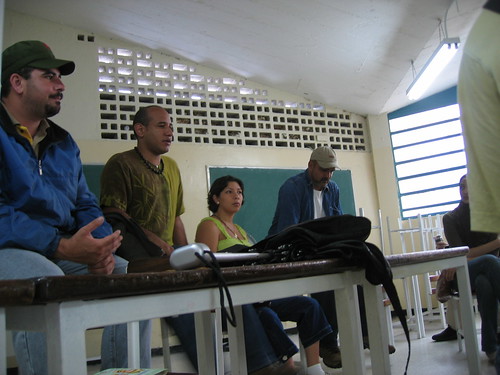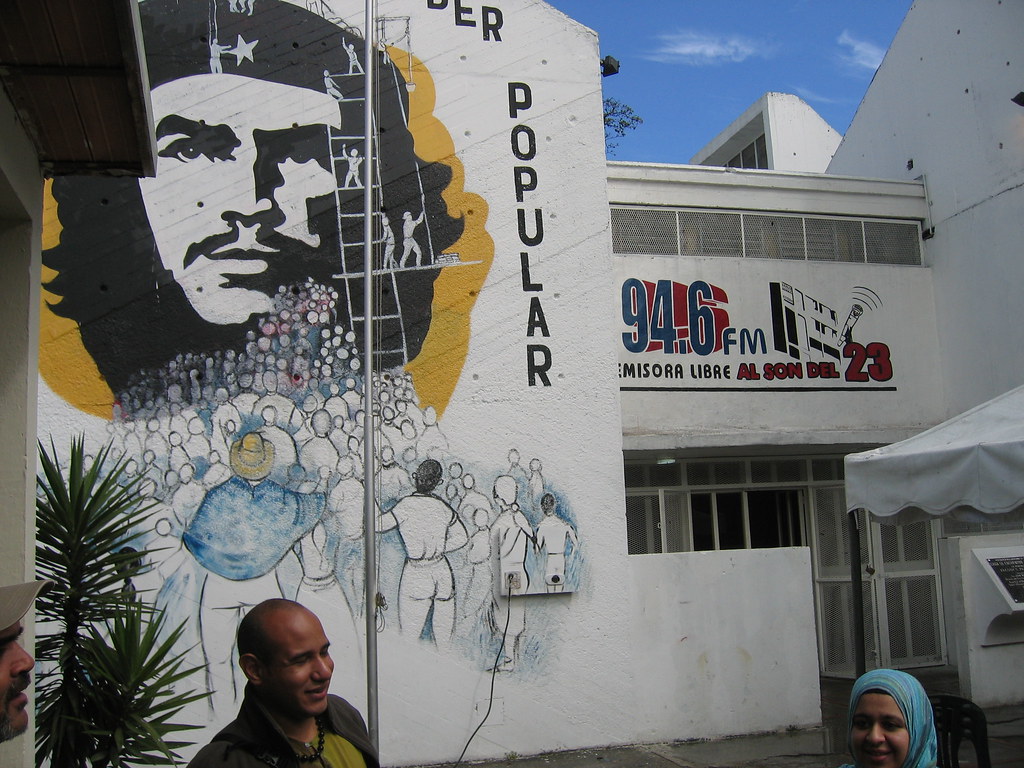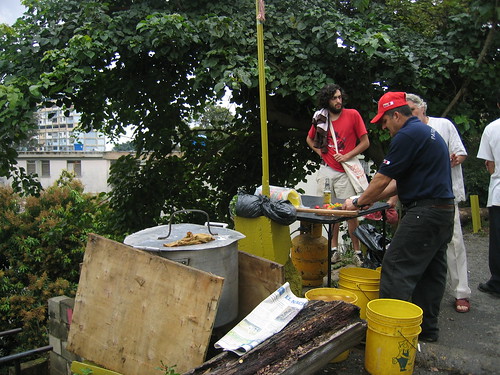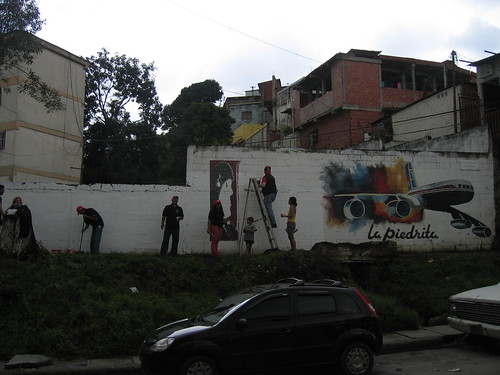

Gustavo, his wife, our translator, and a community leader.
Today we went to the barrio 23 Enero. I have mentioned it before on here, as it is spoken of often in Venezuela. It is spoken of with some sense of dread (the farthest part of the wrong side of the tracks) by the Caracas bourgeoisie. This is the reason that we were told, "be careful in Caracas, they kill white people there." This was merely, on reflection, more disinformation from the right wing of the opposition in Venezuela. The barrio 23 Enero is one of the poorest parts of the urban population in Venezuela, with its own military forces and a decidedly fervent attitude of self sufficiency. The military forces are not a mark of lawlessness (in fact we did not even see them), but more likely a home grown response to and replacement for the classist police that brutalized and tortured the population up until recently.
The entire barrio is the single greatest manifestation of postcapitalist society I have ever seen or even heard about. Cuban doctors live in the neighborhood, with the entire staff volunteering out of thanks for the service provided. Free dental, orthodontal, and vision care is provided through similar avenues. A community radio station now exists where a particularly brutal police station oce stood. Here is a picture of the space today.

Walking through the winding precipitous back alley stairways and navigating our ways through houses stacked upon houses in an almost Dr. Seussian fashion, we came upon a gentleman cooking soup for the community. I could have easily fit inside of this pot of nutritious and fresh food.

The volunteer community organizers have established gas lines for cooking in all the houses, and clean water for drinking. Transportation collectives provide mobility throughout the city and beyond. Impressive sanitation is provided on a volunteer basis. Education is provided day and night in Bolivarian schools that serve the citizens of the 40,000 person barrio. A mural brigade beautifies the walls of the neighborhood with heroes of the revolution and symbols of the struggle they wage. All of these task are done in addition to the day jobs of the people. As an organizer stated, "you might say that the community is our hobby."

There was a distict lack of anger amongst the community members. And they had a lot to be angry about. Recounting the events of the April coup (made popular in The Revolution will Not be Televised), our friend and guide Gustavo Borges said "the cops...they started shooting at us. But, we shot back." Police agression serving anti-popular interests, a historical marginalization of a community reknowned for the indefatiguable leftist spirit, and a lack of representation would be enough for rage to replace determination, but in this case it did not. Each issue was dealt with methodically, with painstaking detail and grave committment. The police, national guard, and militia still exist in the barrio, but under Chavez and thanks to the community, the problems have greatly lessened. The community now operates as a model of DIY Bolivarian Socialist spirit for many throughout the country and continent. And finally, the barrio has won representation.
Regarding the fight for representation, the people of the barrio were long denied national ID cards for reasons almost identical to the anti-immigration sentiments in the USA. "Immigrants will just come and get free services if we give everyone ID cards!" Bullshit. Without ID cards, the people of the barrio could not vote or make use of national services. Now they finally exist in the eyes of the country, replete with the rights garanteed under the new constitution. An interesting aside, the new constitution REQUIRES half of the congress to be women. It also allots permanent seats to indiginous people to provide much needed representation (not to indicate indiginous people are ever treated as they should be, but it's a step.
There is no cynicism, no snarkiness, and no meta-programming via insidious media campaigns to taint the beautiful sentiments one experiences in the barrio 23 Enero. The socialist syndicalism taking place is not party politics, it simply makes the most sense for these people. It allows the greatest amount of good to be done for all. People helping people in a humble, methodical, and definitively human manner. Gustavo tried to convince us they were not "revolutionaries or guerillas, but rather just people." I have never seen anything more revolutionary than this worldview-crushing display of promise for the future. Gustavo and his wife are selfless servents to the spirit of their revolution, and two of the most beautiful people I have ever been priviledged to meet.
Please visit www.el23.net and learn more about this place. The web design is incredibly slick.
said: The info about the barrio was extremely interesting, especially in light of the info we have heard via our press here in the US. It gives me hope that this kind of change is possible.
The reviews/discussions about seeing Chavis was also thought-provoking abd interesting, and what a great experience for you all.
Also, what/who are the Cuban 5?
Barb
